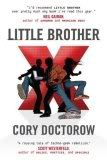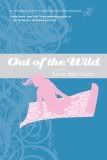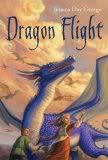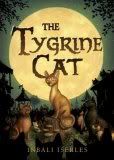Although both books are set in a near-future, dystopian America, it's hard to imagine two books more different, and it got me thinking about the differences.
 Little Brother is set in San Francisco, a couple of years in the future, although it's so close to where we are today that it could as well be tomorrow. Marcus is a seventeen-year-old who knows a lot about technology and how to bend the "systems" to his own ends. Marcus likes to play Alternate Reality Games, or ARGs, which combines computer-based gaming with real world adventures seeking clues out in the city. While Marcus and his team are out searching for the next clue, San Francisco is attacked in the worst terrorist attack in the country's history. In the wrong place at the wrong time, Marcus and his friends are picked up by Homeland Security and interrogated in a secret prison for days. Three of them are eventually released, but one of Marcus' friends never returns. San Francisco has become a police state, as Homeland Security continues to crack down with ever tighter security. Marcus fights back in the only way he knows how, using his wits and technology to outsmart Homeland Security, and spark a revolution.
Little Brother is set in San Francisco, a couple of years in the future, although it's so close to where we are today that it could as well be tomorrow. Marcus is a seventeen-year-old who knows a lot about technology and how to bend the "systems" to his own ends. Marcus likes to play Alternate Reality Games, or ARGs, which combines computer-based gaming with real world adventures seeking clues out in the city. While Marcus and his team are out searching for the next clue, San Francisco is attacked in the worst terrorist attack in the country's history. In the wrong place at the wrong time, Marcus and his friends are picked up by Homeland Security and interrogated in a secret prison for days. Three of them are eventually released, but one of Marcus' friends never returns. San Francisco has become a police state, as Homeland Security continues to crack down with ever tighter security. Marcus fights back in the only way he knows how, using his wits and technology to outsmart Homeland Security, and spark a revolution.It's hard to know what to make of Little Brother. It breaks some of the rules of good writing, and in a literary sense, it isn't very well written. For example, there are many sections where the flow of the story is interrupted for several pages of description of things like encryption or the civil rights movement. And it's clearly a message book - something that's normally considered a big no-no for YA fiction.
And yet. In spite of all this, Little Brother is a darn good story. The plot is exciting and relevant, and Doctorow has done a great job of capturing an authentic teen voice. The long, technical asides will most likely appeal to his audience, and the message is one that will resonate with most teens. I personally couldn't put it down and loved every minute of it. I even enjoyed the technical descriptions, although I confess to being something of a geek myself, and I agree with the message. As I was reading it, I started thinking of young people that I wanted to pass this book along to. In fact, I wish that every teen in the U.S. - and every adult - would read this book.
I do have one more little quibble with the book. One of the strong themes in the book is one of youth empowerment, and yet for all that Marcus and his friends accomplish, nothing is solved until the adults get involved. Don't get me wrong; Marcus is a true hero, and his accomplishments are essential in moving towards the ultimate resolution. But the turning point of the book is clearly the moment when the adults get involved. It may be more believable, but I feel that it weakens the theme.
 The Adoration of Jenna Fox is set a little further in the future, but not so far that you can't see it as a natural outgrowth of the present. Jenna Fox has just awakened from a year-long coma following a terrible accident that no one will tell her about. Jenna remembers nothing, and she tries to reclaim her past and her identity by watching videos that her parents recorded of her over the years. Jenna begins to piece together an identity for herself, as she integrates fragments of resurfaced memory with new experiences and feelings. But is the new Jenna Fox the same person as she was before the accident? And why does she increasingly get the sense that her parents aren't telling her everything. I can't say too much about this book without spoiling some of the surprises, but you'll have to trust me that there is a futuristic/dystopian element to it.
The Adoration of Jenna Fox is set a little further in the future, but not so far that you can't see it as a natural outgrowth of the present. Jenna Fox has just awakened from a year-long coma following a terrible accident that no one will tell her about. Jenna remembers nothing, and she tries to reclaim her past and her identity by watching videos that her parents recorded of her over the years. Jenna begins to piece together an identity for herself, as she integrates fragments of resurfaced memory with new experiences and feelings. But is the new Jenna Fox the same person as she was before the accident? And why does she increasingly get the sense that her parents aren't telling her everything. I can't say too much about this book without spoiling some of the surprises, but you'll have to trust me that there is a futuristic/dystopian element to it.The Adoration of Jenna Fox is as literary as Little Brother isn't. It's beautifully written; poetic even. It's tightly plotted; the characters have depth, and issues of identity and scientific ethics are explored in a balanced way. And yet. I have to confess that I didn't enjoy it as much as I enjoyed Little Brother. Don't get me wrong, I did enjoy it. The Adoration of Jenna Fox is an excellent book. But I never completely got wrapped up in it the way I did with Little Brother. I think that in part this is because Jenna's lack of emotion in the beginning of the book distances you from her from the start, and although she does begin to feel emotions again, I never completely was able to cross that distance to identify with her. It's a beautiful book and I enjoyed it, but it was more of an external enjoyment, an appreciation of its literary qualities.
I'm not sure if any of this says anything about the quality of either book. It may say more about my personal preference than about the books themselves. I just found it interesting reading the books back to back and comparing their merits. Obviously these are two books that will appeal to very different audiences. (I refuse to classify books as "boy" books or "girl" books - I'm a girl and I know which one I preferred - and I don't believe in genderizing books. But the temptation is there to do just that with these books.) Both Little Brother and The Adoration of Jenna Fox are outstanding books that are well worth reading.
Little Brother has some minor sexual content at a level that would probably be appropriate for high school age and above.
Blogged with the Flock Browser



